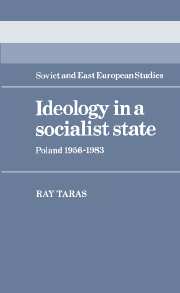Book contents
- Frontmatter
- Contents
- Preface
- 1 The concept of ideology and Western sociology
- 2 Approaches to the study of ideology in a socialist state
- 3 The Polish road: fact and fable, 1956–59
- 4 Little stabilisation and great upheaval, 1960–70
- 5 Prosperity and political style in the second Poland, 1971–75
- 6 Propaganda of success and prognoses of failure, 1976–80
- 7 Interlude I: Solidarity, 1980–81
- 8 Interlude II: martial law, 1981–82
- 9 Operative ideology, fundamental principles and social reality
- Appendix: Central Committee Plenum meetings, Party Congresses and National Party Conferences, 1956–83
- Notes
- Bibliography
- Index
4 - Little stabilisation and great upheaval, 1960–70
Published online by Cambridge University Press: 21 September 2009
- Frontmatter
- Contents
- Preface
- 1 The concept of ideology and Western sociology
- 2 Approaches to the study of ideology in a socialist state
- 3 The Polish road: fact and fable, 1956–59
- 4 Little stabilisation and great upheaval, 1960–70
- 5 Prosperity and political style in the second Poland, 1971–75
- 6 Propaganda of success and prognoses of failure, 1976–80
- 7 Interlude I: Solidarity, 1980–81
- 8 Interlude II: martial law, 1981–82
- 9 Operative ideology, fundamental principles and social reality
- Appendix: Central Committee Plenum meetings, Party Congresses and National Party Conferences, 1956–83
- Notes
- Bibliography
- Index
Summary
During the entire twenty-year period, we have listened to feeble abuse and slander levelled by imperialist broadcasting services, bankrupt elements thrown overboard, representatives of the old reactionary regime, and common traitors who sold themselves to foreign intelligence. If all the efforts of the enemies of socialism, of People's Poland, have ended up in a crushing fiasco, it is because the social and political base on which they could rest in their struggle against our people's state and authority has diminished from year to year. Today we are creating a society of working people without the old divisions into exploiters and exploited, without class antagonisms – a society regenerated in its composition and social structure.
Władysław Gomułka, 20th anniversary of the founding of People's Poland, July 1964Apologists for the Gomutka leadership have characterised the 1960s as a period of political and economic consolidation – a so-called little stabilisation period. Critics describe it as one of political and economic stagnation, eventual upheavals and disintegration. Both assume uninterrupted linear development leading either to a series of minor achievements or to failures. Yet the distinctive feature of that decade was the frequent political turns or ‘zigzags’ (as the rulers described them) that took place. The most important political cleavages were the conflict with intellectuals over Polish culture in 1964, the controversy between church and state over the celebration of the Millennium of Poland, which fell in 1966, the student demonstrations of March 1968, and the disturbances on the Baltic coast in December 1970, which toppled the Gomulka administration.
- Type
- Chapter
- Information
- Ideology in a Socialist StatePoland 1956–1983, pp. 72 - 107Publisher: Cambridge University PressPrint publication year: 1984



